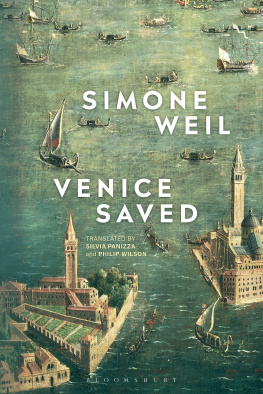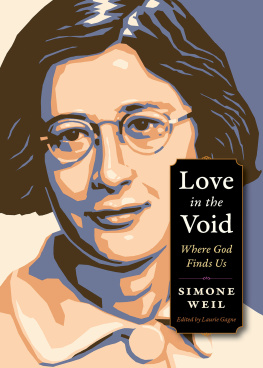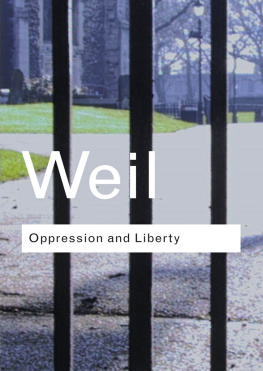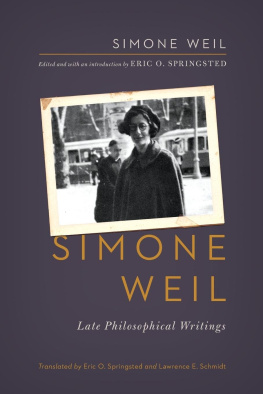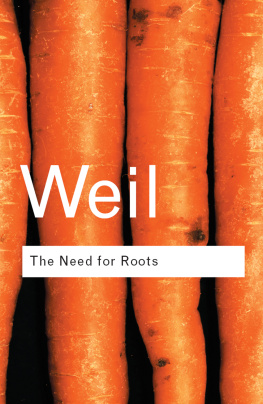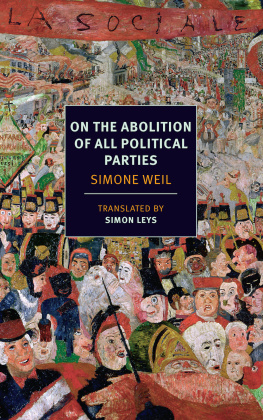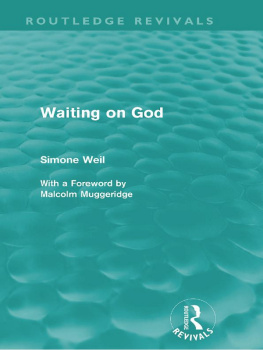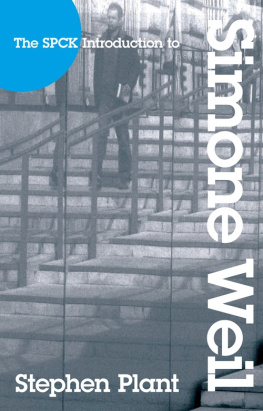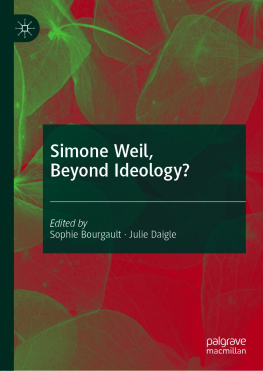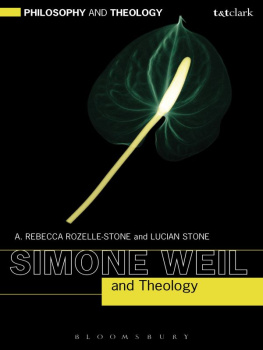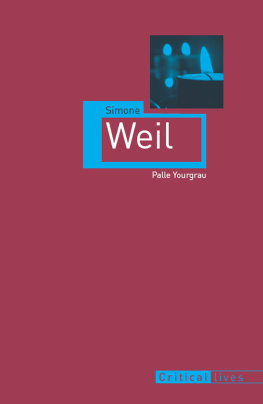Venice Saved
Also available from Bloomsbury
Antigone, Slavoj iek
Alienation and Freedom, Frantz Fanon
Simone Weil and Theology, A. Rebecca Rozelle-Stone
Simone Weil, Mario von der Ruhr
The Relevance of the Radical: Simone Weil 100 Years Later, edited by A. Rebecca Rozelle-Stone
Venice Saved
Simone Weil
Translated and Introduced by
Silvia Panizza and Philip Wilson,
University of East Anglia, UK

Contents
We should like to thank our colleague Davide Rizza for suggesting the project to us in the first place and for being generous with his expert knowledge of Simone Weil. Our colleague Gareth Jones has offered constant support and philosophical advice and is due a great debt.
We are immensely grateful to Frankie Mace, our amazing editor at Bloomsbury, who accepted the project and offered constant encouragement and guidance along the way.
In addition, we have been fortunate to have had invaluable help with issues of elucidation and translation. Thank you to Coralie Bastiaens, Jean Boase-Beier, Jolanda Caprioglio, Tomeu Estelrich, Marc Fielder, Tony Gash, Alice Leal, Giulio Panizza, A. Rebecca Rozelle-Stone, Max Schleicher, Gabril Maes, Stephen Spencer, Helen Tierney and Ingrid Walton. We should also like to thank Bloomsburys two anonymous reviewers for their excellent advice. Any errors or omissions are of course our own.
Our discussions of the life of Simone Weil draw on the chronology and the autobiographical writings and letters in Florence de Lussys 1999 edition of Weils works (Weil 1999); Richard Reess translation of Seventy Letters (Weil 1965); biographical work by Gabriella Fiori (1989), Simone Ptrement (1976) and Stephen Plant (2007).
Silvia Panizza
Philip Wilson
Silvia Panizza Lecturer in Ethics at the University of East Anglia, Medical School, having previously taught at Anglia Ruskin University and the University of Genoa. She works in moral philosophy, philosophy of religion and philosophy and/of literature, and has investigated the idea of attention in Simone Weil and Iris Murdoch. She has published on Weil and the possibility of secular mysticism, William Hazlitt, Lawrence Durrell and animal ethics. She has a chapter on Ludwig Wittgenstein in the Routledge Handbook of Translation and Philosophy (2019).
Philip Wilson teaches philosophy at the University of East Anglia. Publications include The Luther Breviary (translated with John Gledhill, 2007); Literary Translation: Re-drawing the Boundaries (edited with Jean Boase-Beier and Antoinette Fawcett, 2014); The Bright Rose: German Verse 800-1280 (translated and edited, 2015); Translation after Wittgenstein (2015); The Routledge Handbook of Translation and Philosophy (edited with Piers Rawling, 2019); Alexander Nevilles Norwich Histories (translated and edited with Ingrid Walton and Clive Wilkins-Jones, forthcoming). His research interests include the links between mysticism, esotericism and translation.
At the end of her life, in extremely difficult circumstances, the French philosopher Simone Weil (190943) worked on (but did not finish) her only play, Venise Sauve (henceforth Venice Saved ). It has been largely ignored and has never before been published in an English translation. Interest in Weils work has increased massively since her death and continues to grow, so that publishing this play in English will enable readers to expand their view of this important writer.
Weil occupies a unique place in the philosophy of the twentieth century. She is not regarded as having changed the field like her contemporaries Martin Heidegger and Ludwig Wittgenstein. She published no major work in her lifetime and, unlike most major philosophers, never taught in a university. Yet her writings philosophical, political and religious continue to inspire many and she is the focus of a great deal of academic research. Her ongoing influence can be seen on authors who work outside professional philosophy, especially those involved in the creative arts: she is a protagonist in Anne Carsons poetic opera Decreation (2005); the film An Encounter with Simone Weil (2011) by Julia Haslett interprets Weil in the light of her contention that our damaged world needs attention; Kiaja Saariahos musical oratorio La Passion de Simone (The Passion of Simone) (2013) blends Weils life with the Stations of the Cross; a recent poem by Rebecca Tams, Simone Weil, is a sensitive exploration of Weils mystical form of life (2017: n.p.). That Weil herself produced creative writing some poems and this play is often overlooked by readers and provides an indirect way of approaching her philosophy, as well as being of interest in itself.
We have also translated the notes that Weil wrote about Venice Saved and her sketches for the unwritten scenes, and have written four introductory chapters on Weils life and philosophy; how the play came to be written and what it has to say; Weils view of tragedy; the issues raised by writing an English version of this drama. There are translators notes on the play, suggestions for further reading and a bibliography of all works used in writing the introductory material.
In the introductory material and the translators notes, we reference Weils work by abbreviated title and page and thus (GG 50) is a reference to Gravity and Grace page 50. Full details of books used are in the bibliography. Weils works are abbreviated as follows:
APP | On the Abolition of All Political Parties (2014) |
GG | Gravity and Grace (2003) |
IC | Intimations of Christianity among the Ancient Greeks (1957) |
IP | The Iliad, or The Poem of Force (2005) |
LP | Letter to a Priest (2002a) |
LPW | Late Philosophical Writings (2015) |
NB | The Notebooks of Simone Weil (1951) |
NR | The Need for Roots (2002) |
O | uvres (1999) |
OL | Oppression and Liberty (2001) |
PVS | Pomes suivis de Venise sauve, Lettre de Paul Valry (1968) |
SL | Seventy Letters (1965) |
WG | Waiting for God (1978) |
Sarah Bakewell calls Weils life a profound and challenging application of Iris Murdochs notion that a philosophy can be inhabited (). Something similar is true of Weil, a woman whose commitment to truth took her into school teaching, political activism, factory work, the Spanish Civil War and intellectual labour for the Free French government in exile in London. For her, philosophy was not a matter of solving metaphysical problems in academic papers, but a lived reality.
Weil began to write Venice Saved in 1940, the year in which France fell to German forces. She based it on a historical fiction published in 1674 by the Abb de Saint-Ral (Csar Vichard), : 191). The project was important to Weil. In a letter of 1937 she had asked why she could not have the n existences she needed, in order to devote one of them to the theatre (SL 91). She frequently mentioned the play to friends, showed them work in progress, made various drafts and at the end of her life asked for her notes together with a copy of the play to be sent to her in London. Only her death in 1943 prevented her from completing it.

